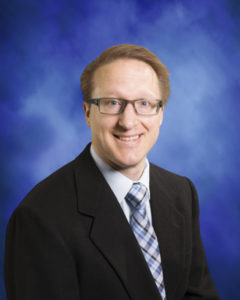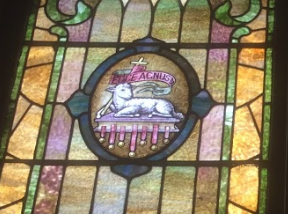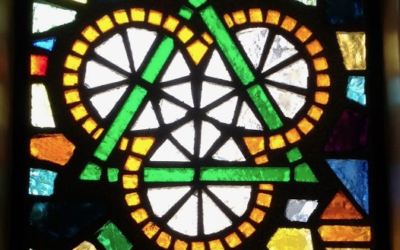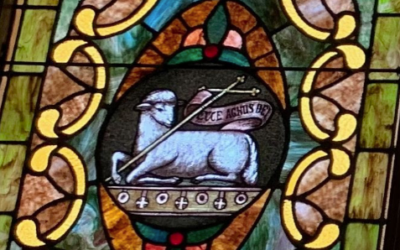Faith finds service a privilege
Watch the service
No recording this week.
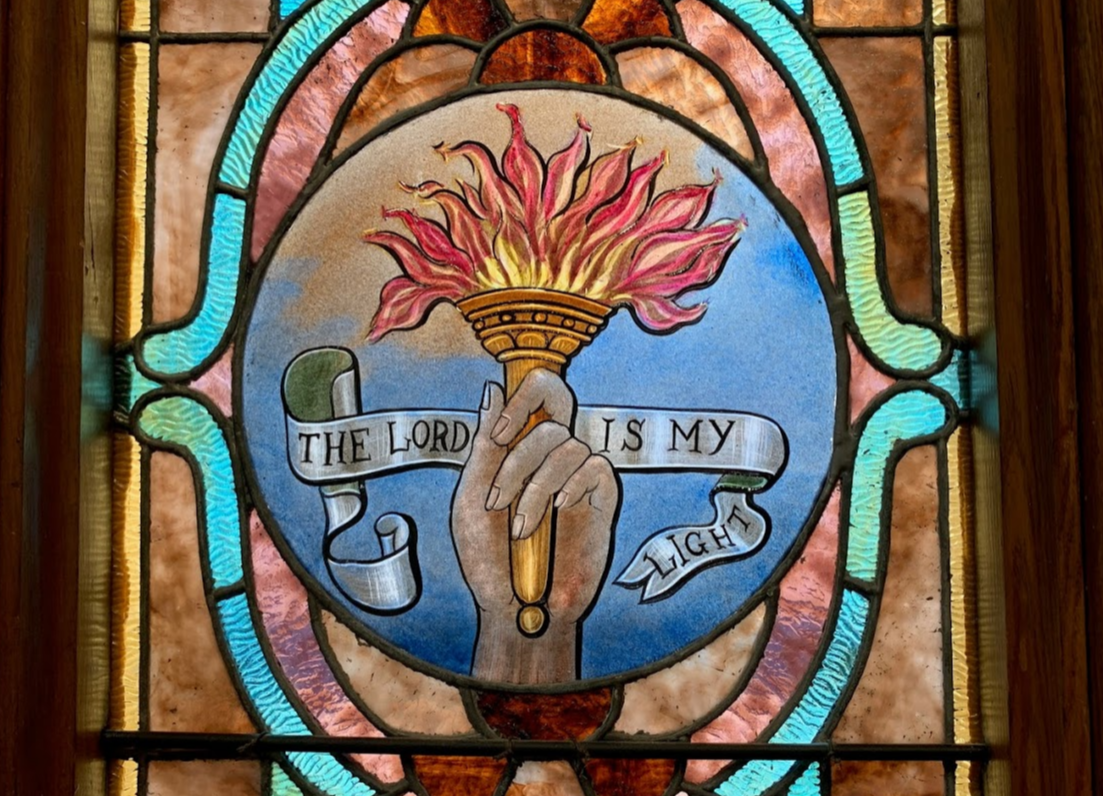
Read the sermon
Pause
We cannot go on. Every Sunday we say the Lord’s Prayer. And at the end of the Lord’s prayer there is this doxology—this statement of praise. It has become part of our worship. And we could not consider not having it there. But, my dear friends in Christ, the doxology wasn’t there in the beginning. If you look at the Lord’s Prayer in Matthew and Luke’s gospel, there is no doxology. Well, how did it get there? The best answer I’ve heard is that the early Christians could not help from adding it. They said to themselves, we cannot go on. “We need to pause here and give our God praise for this amazing prayer he gives to us.” So they added it. They added it so that every time we would speak this prayer we would have the opportunity to pause and praise our Triune God. In the words we look at this morning we have the same sort of context. David is at the end of his years on this earth. He pauses in awe and appreciation. He pauses, first of all, to praise his Lord. In 1 Chronicles 29, we read: “1 Then King David said to the whole assembly: “My son Solomon, the one whom God has chosen, is young and inexperienced. The task is great, because this palatial structure is not for man but for the Lord God. 2 With all my resources I have provided for the temple of my God—gold for the gold work, silver for the silver, bronze for the bronze, iron for the iron and wood for the wood, as well as onyx for the settings, turquoise, stones of various colors, and all kinds of fine stone and marble—all of these in large quantities. 10 David praised the Lord in the presence of the whole assembly, saying, “Praise be to you, Lord, the God of our father Israel, from everlasting to everlasting. 11 Yours, Lord, is the greatness and the power and the glory and the majesty and the splendor, for everything in heaven and earth is yours. Yours, Lord, is the kingdom; you are exalted as head over all. 12 Wealth and honor come from you; you are the ruler of all things. In your hands are strength and power to exalt and give strength to all. 13 Now, our God, we give you thanks, and praise your glorious name.” (1 Chr. 29:1–2, 10–13 NIV11-GKE)
The context in these words is that David, earlier on, had told the Lord that he wanted to build a house, a temple for him. And the Lord said, “no.” David had blood on his hands. Instead, his son, Solomon would be the one to build the temple. And here David was. He was awed and humbled at the possessions piled up. And he was humbled at the people who brought these gifts forward. So he pauses and praises the Lord. And then in the words that follow, he lets us know even more so what he praises him for: “14 “But who am I, and who are my people, that we should be able to give as generously as this? Everything comes from you, and we have given you only what comes from your hand. 15 We are foreigners and strangers in your sight, as were all our ancestors. Our days on earth are like a shadow, without hope. 16 Lord our God, all this abundance that we have provided for building you a temple for your Holy Name comes from your hand, and all of it belongs to you.” (1 Chr. 29:14–16 NIV11-GKE)
These are words you have to picture. There is David, surrounded by these piles of precious possessions. And, in praise to his God above, he says a simple truth, but a powerful one: All this comes from the Lord’s hands.1 The possessions and the ability to make the possessions came from the Lord’s hand. It’s a simple truth. But it’s easy to forget. Many years ago there was a man in my congregation who told me, “Pastor, I know that I don’t give very much or very often to your church. But, when things go bad, you let me know. I’ll be there to help.” You see, he had all of his money tied up in property. And it wasn’t easy to sell it off every week or month to give that to his church. And I remember driving home thinking how generous the man was. Then I thought about it a little more and realized that his attitude was very misguided. For it wasn’t my church. That church I served in belonged to Jesus. I was just a slave and a servant of the word there. And in that context, think through what the man was saying. He was saying, “Jesus, when times are tough, I will be your rescuer, your redeemer, your savior.” He promised that he would be there to bail out the church. The man was missing out on the simple truth that David was saying here. Every thing we have and the ability to create wealth comes from our Triune God.
We are not redeemers. We are not saviors. What are we? David let’s us know that we are shadows passing along the ground.2 It’s hard to get more humbling than that. But with that realization there begins to be hope. For each of us has the temptation to be God’s rescuer. But it is only when we begin to realize that we are the ones who need to be rescued that there is hope in this life and the next. David cries out those amazing words, “who am I?” And we can say the same. Who am I that God would care for me? Who am I that God would create me, clothe me, and watch over me? Who am I that God would send his Son to save me from my sins? Who am I that when all my possessions are gone and my ability to make money is gone he would still watch over me and give me a place in heaven? And yet, by his grace he does all this.
So David pauses to praise. He finishes with a prayer: “17 I know, my God, that you test the heart and are pleased with integrity. All these things I have given willingly and with honest intent. And now I have seen with joy how willingly your people who are here have given to you. 18 Lord, the God of our fathers Abraham, Isaac and Israel, keep these desires and thoughts in the hearts of your people forever, and keep their hearts loyal to you.” (1 Chr. 29:17–18 NIV11-GKE)
Each of us has a sinful nature. And the first trap our sinful selves lay in front of us is to make ourselves God’s redeemers and rescuers. But there is a second trap. The second trap is to praise God on the big days and then forget later on. And notice what David prays for here in these words. He prays that the willingness would always be in their hearts forever. My dad told me the story of how his first ancestors came over to North Dakota. They lived in sod houses. These houses had only one window in them so that they could see the sun when they got up. Later on they built their own wood homes. And as they built wood houses they built wood churches. And then, later on, the wood churches were replaced by stone and brick churches. And David knew that when that temple of stone would be built, the longer the days travelled on from the day David was standing there in front of his people, there would be the temptation that the willingness to give generously would fade. And instead of having willingness inside their hearts, they would have habit or even worse, guilt. And finally then, there would be no giving.
That’s the problem. But again, notice David’s thinking. He stops and pauses. And he says, “who am I that God would care for me?” But in the final words, notice how he goes in the opposite direction. He says, “who am I that I would care for you?” And each of us can say the same. Who am I that God would send his Holy Spirit so that we would care and even notice our God and his gracious hand? Who are we that God would melt our hearts of stone and give us hearts of flesh? Who are we that God would give us willingness?
So my dear friends in Christ, when there are big, momentous times in your life, pause and praise your Lord. But my friends, just like that doxology at the end of the Lord’s prayer, let there also be smaller, regular, all-the-time sorts of opportunities to pause and praise him too. For as we do that, we will have the reminder that wealth and the ability to make wealth all comes from his hands. And even through we and our days are like shadows here on this earth, because Jesus died for our sins, we have a permanent place in heaven. Let us pause—in praise and in prayer. Amen.
1 כָּזֹ֑את כִּֽי־מִמְּךָ֣ הַכֹּ֔ל וּמִיָּדְךָ֖ (v. 14)
2 כַּצֵּ֧ל ׀ יָמֵ֛ינוּ עַל־הָאָ֖רֶץ (vs. 15)
